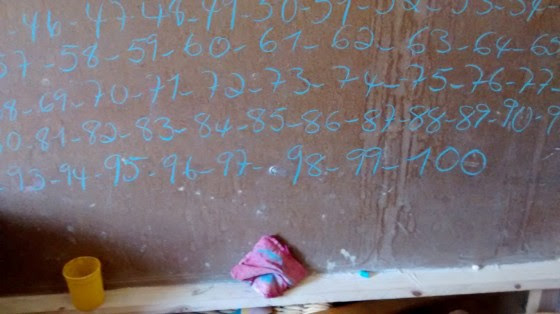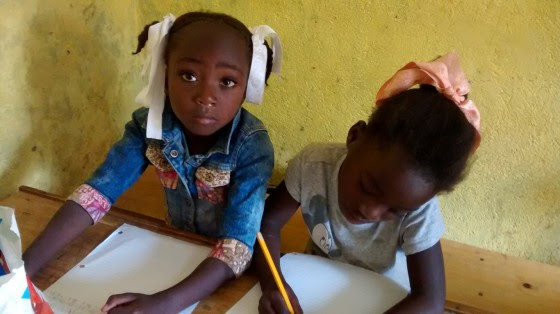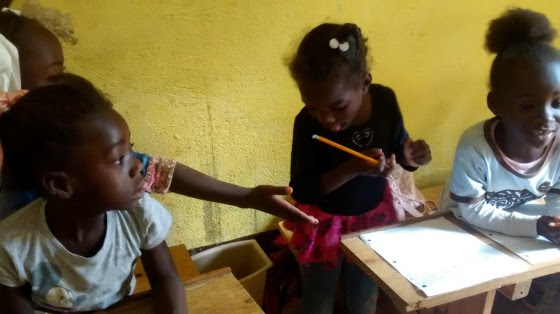Back in Haiti, everyone. Arrived in Bois D’Avril last night and spent the morning observing classes at the local school. If I’m going to be working in education here, I need to get a better understanding of what’s going on in lots of different locations. All of our other laptop projects outside of Port-au-Prince are in market towns, but Bois D’Avril is a small farming village up in the mountains. I first came here back in the summer to set up the laptops; while I’m here I stay with John and Deb, a Canadian couple who have been here for 33 years and really care about making a small but lasting difference.
The school’s expanded within the last year from around 30 students to around 60. There are four teachers and four classrooms, teaching grades K-5. There’s not enough space in the little yellow school building for everyone, so fourth and fifth graders meet in the downstairs area of John and Deb’s home. That’s also where our laptop project is housed.
Class starts at 8 in the morning, stop for a snack / recess break at 10:30, and resumes around 11. On Fridays they go until 12 only; the rest of the week they go until 2. The kids just got down with the state exams, and this coming Monday will be their last day before winter vacation.
1st Grade
I started the morning in the first-grade class. Christelle, the school’s director, sat in a tiny room (about the size of a walk-in closet) crammed with 8 kids, desks, and a chalkboard. In Haiti, students normally sit in rows on benches with sloped writing surfaces. This room had some of those, but there was also a round table, probably donated.
Christelle opened the lesson by introducing me and encouraging the kids to ask me questions. I ended up answering and asking “What is your name?” eight different times. Christelle asked the kids if they had used the computers and used the fact that the computers have a turtle to transition to a silly rhyme about a turtle from the textbook. The kids had heard it before and tried to recite it, but it was nonsensical and in French, so I doubt they knew what they were saying. Then, Christelle started language class. I’m pretty sure the book was intended for French practice because the chapter title was in French, but Christelle did all the discussion in Creole. She asked the kids what they saw in the pictures and pointed out the different pieces of the car like the tire and the engine, as well as tools like wrenches. The kids seemed to know more or less what was going on, and contributed when they could. Christelle emphasized throughout that going to school and studying hard is important: “if you study hard, you can get a car like this someday? And what if your car breaks? If you study hard, you’ll have money to pay the mechanic.”
After that, the children pulled out their own books and opened to a page about the letter ‘S.’ Christelle told them that ‘S’ is the first letter in “silans”; one girl muttered “segond” and Christelle congratulated her for making the connection. Then, the kids read some syllables to review other letter sounds – just random combinations of vowels and consonants that they recited line by line in unison. Most of them seemed to know what they were doing – every so often, one would mess up and go to the next column instead of the next row, and they’d still get it right. Christelle had to break the rhythm several times in order to remind them that the accented e sound is shorter than the regular e sound.

Numbers 1 – 100.
When I returned to the classroom after snack / recess break to take photos, the kids were copying down the numbers from 1 – 100, which Christelle had written on the blackboard for them. Christelle was setting up ID card photos with some people from the community, so she couldn’t be in the room with them and might have just been giving them something to do.
Kindergarten
The kindergarten class was in a larger room decorated with flags. The 15 students were grouped at round tables and the young male teacher stood at the front of the room at a chalkboard. Not all the students were facing him, but at least at the beginning of the lesson most seemed to be paying attention. The teacher would write a letter on the board, and then pair it up with several vowels: “a”, “e”, “i”, “o”, and “u.” First, for example, the kids said “That’s the letter F!” in unison. Then, the teacher made the letter’s sound for them (“f” says “fffffff”) and had the students all repeat it. Then, he asked: “What do ‘f’ and ‘a’ make?” and pointed to the syllable; the class said “fa” together. The teacher went down the list, stopping to correct the student’s pronunciation of “e” and “u” each time – the French versions of these vowels are different from the Creole version. The teachers’ questions and the students’ responses were in French, but the repetition made it easy for the students to understand. The kids applauded after this process was finished for each letter.
The teacher was getting a little frustrated with the pronunciation problems (and the students were getting a little bored), so he kept his patience and transitioned to a “circle the vowel” activity. He wrote the vowels up on the board, including ‘y’ this time. He wrote a series of words underneath. No one knew what a vowel was when he asked, but the first kid he called up to the board successfully circled all of them, maybe by just looking at the shapes. The next two kids both struggled and took a long time; the class lost interest quickly and started chatting among themselves and trying to get my attention. The teacher kept pushing valiantly through things. Some of the words he wrote on the board were in Creole, but most were in French. After the vowel activity, the teacher wrote up the vowels again and reminded the kids that “these are vowels and they are very important.” Then, he moved on to colors, which most people participated in loudly. The teacher made sure to show the cards a second time to a table that was being particularly quiet. After break, the teacher passed out coloring books and crayons, and everyone got to work, demonstrating some impressive staying-in-the-lines skills.
Throughout the class, the teacher seemed to be consulting a textbook that he held in his hand, behind his back. You have to go through his room to get to the supply room and bathroom, so class was constantly interrupted by passing students. The supply room also had a bed: at one point, when a girl fell asleep, the teacher carried her back there for a nap.
2nd & 3rd Grade
I moved on to the second and third graders, a group of 17 combined into one classroom and seated on desk-benches in front of a board. Roberta, their teacher, was calling them individually to the front to check their prepared reading in French. Some had a page and a half (a few paragraphs) to read; others were just pronouncing words next to pictures. Roberta was seated, held the book, and pointed to the words with a black permanent marker that someone had to procure from the supply room. Most of the kids read fairly quickly and had decent pronunciation. The few mistakes Roberta corrected them on were errors that resulted from guessing too quickly: “retire des sandals” (take off shoes) as opposed to the correct “retire des privileges” (take away privileges) and “commencement” (beginning) vs. “commerçant” (merchant). But, those words also really didn’t make too much sense in the context of the passage. Roberta checked student understanding with the translation section printed underneath each passage. Students were supposed to translate Creole sentences into French, but the sentences were from the passage, so all they had to do was find the appropriate point and read. I was glad the kids could read Creole, and at least they’d done their homework because they found the “translations” pretty quickly for the most part.
When I came back after the break, Roberta had written “Je vais tous les jours a l’ecole” (I go to school every day) on the board and the students were copying it to practice their handwriting, in cursive. Each kid had a notebook paper with 25 lines, and they were supposed to go all the way down the page, one line at a time. Of course, I was a welcome distraction in this scenario. One kid asked me to write a sentence to “prove that you know how to write”; then everybody was trying that trick. Roberta went around the room checking papers and telling kids to write the each sentence out instead of doing the words one at a time in columns. The students often forgot a letter at some point and then continued to make the same mistake on all the subsequent sentences. Two sisters in the front row finished quickly and spent the rest of class flipping through their science textbooks and singing. Everyone else struggled. Most got halfway down the page, although others did manage to get it done closer towards the end of class.
Teacher Interviews
Over break and as classes were ending, I had the chance to talk to the teachers. None of them are Bois D’Avril locals – they’re all from the city, Port-au-Prince, and they go home on the weekends. Christelle’s been making the trips for three years; the other two just started this school year, 3 months ago (I think some of the regular folks are out on maternity leave). Roberta has 3 years of teaching experience, whereas the male teacher had 6, working with an international organization. Both of them studied education in seminaire.
I asked the male teacher whether he learned about how to teach reading in school or from his international organization. He explained that he’s had to come up with his own methods, suited to Haiti and the government curriculum, because neither experience really prepared him. I talked with Roberta about the students’ French reading abilities. She’s proud of how far they’ve come. I asked if they ever get time to practice writing and she explained it’s all copying things down from the board. Both teachers used cursive (ekriti kole) when writing, which I personally think is more difficult to read than print. Roberta explained that it’s faster to write than print. It also seemed to be what textbooks wanted for the sections where a student was supposed to write something.
Some of the parents started coming around as everything was wrapping up. Most all of them are farmers, raising pepper, carrots, and potatoes on the steep slopes. Some can read. Roberta told me that kids can also get help from the older kids with their homework.
Christelle and I also talked a little bit about the 4th and 5th graders, who I didn’t get a chance to see. Many of them don’t have parents and are very difficult to control – she’s basically given up on them, and is much more hopeful about the first graders. The 4th and 5th grade teacher is also male and recently hired; the other day he attempted to beat everyone with a belt for not doing their homework. Deb wants to get rid of him, but Christelle’s in charge, and recruiting teachers who are willing to come all the way up here is difficult.
Overall, I can’t say I wasn’t expecting any of this, but it was worthwhile to see it in action as an observer – normally when I’m visiting somewhere, I’m busy working or I just have other roles besides a pair of eyes. It’s clear that the teachers I saw really care about the kids and are pushing them to succeed. I should also note that the Friday after exams and before winter break is not a good time to really make any judgments about the actual situation.
But it looks like at some point teachers were getting tired and running out of things to do with the kids, hence the more mindless activities like copying the numbers. Classes are small enough here and the teachers have enough support to do things differently, but those kinds of changes will take some creativity and willingness to adapt on the part of both the teachers and the students. The teachers were taught with these same methods and it worked for them, after all.
This is where I’m thinking technology might be helpful – it’s a new, fresh context for the kids to apply what they’re learning and explore new things. But, the 4th and 5th graders have apparently been skipping those classes; others are excited but it will take time before they really understand these machines. The kids here have never heard of Facebook or Google; they don’t even have phones. I’m actually excited about that because I think it means they will be more open to the possibilities than kids who think they already know what computers are for, but it still means this will take time.
But it looks like at some point teachers were getting tired and running out of things to do with the kids, hence the more mindless activities like copying the numbers. Classes are small enough here and the teachers have enough support to do things differently, but those kinds of changes will take some creativity and willingness to adapt on the part of both the teachers and the students. The teachers were taught with these same methods and it worked for them, after all.
This is where I’m thinking technology might be helpful – it’s a new, fresh context for the kids to apply what they’re learning and explore new things. But, the 4th and 5th graders have apparently been skipping those classes; others are excited but it will take time before they really understand these machines. The kids here have never heard of Facebook or Google; they don’t even have phones. I’m actually excited about that because I think it means they will be more open to the possibilities than kids who think they already know what computers are for, but it still means this will take time.
buildingaschool | December 15, 2014 at 7:49 pm


